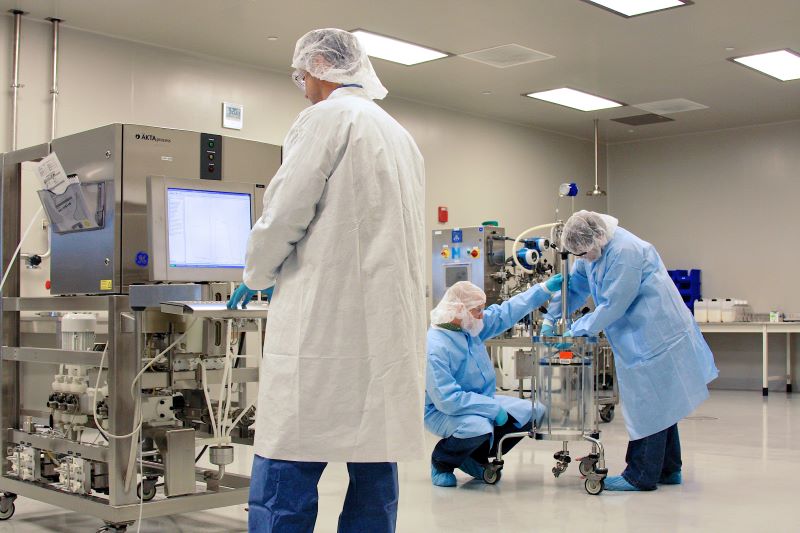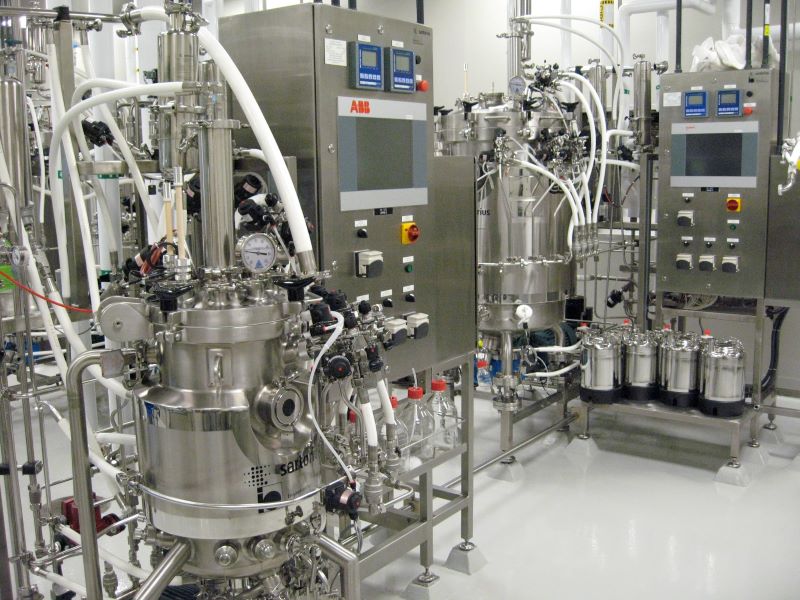
BTEC - Training NC's growing biopharma manufacturing workforce
Robbie King, a Ph.D. geochemist, was looking for a career change.
He considered taking chemistry courses at North Carolina State University. But he ended up at the school’s Golden LEAF Biomanufacturing Training and Education Center (BTEC) instead.
King completed BTEC’s one-year certificate program in 2021 and immediately went to work for Abzena, a contract research, development and manufacturing organization in Sandford. He’s now employed by pharmaceutical giant Pfizer in quality control and analytics, supporting the company’s Sanford operations.

“At BTEC, I received all the training I needed to hit the ground running,” King said. “The professors are incredibly knowledgeable, it’s a no-nonsense, hands-on curriculum, and you don’t waste time. Everybody I knew there got a job before they left the program.”
Jacob Jacobs was twice a BTEC student. First, he received his undergraduate degree in chemical engineering at NC State – with a BTEC minor. A few years later, to expand his skillset, Jacobs enrolled in BTEC’s master’s program in biomanufacturing – while working full time. He has a global job with Pfizer in strategy and operational excellence.
“I really loved the program, both as a graduate and undergraduate student,” Jacobs recalled. “BTEC provided an excellent high-level understanding of the entire industry, and the master’s curriculum helped me fill my knowledge gaps so I could jump right into a new role as a project manager.”
BTEC opened the doors to its new facility at NC State in 2007 with one primary goal in mind: to develop the best trained, most industry focused professionals possible for the state’s biopharmaceutical manufacturing industry. That according to the center’s Executive Director, Gary Gilleskie, Ph.D., who has been a part of the program almost since its inception.

BTEC is located on NC State’s Centennial Campus and is part of the university’s College of Engineering.
The center operates out of a 77,700-square-foot main building, along with a 5,000-square-foot annex in the university’s Keystone Science Center. The two facilities house more than $18 million of industry-standard equipment and a simulated GMP (current Good Manufacturing Practice) pilot plant.
The center’s arrival 17 years ago couldn’t have been better timed. During the past decade and a half, North Carolina has become a hotbed for biopharmaceutical manufacturing. Close to 109 biopharmaceutical manufacturing sites span the state, employing more than 32,000 people at an average salary of almost $93,000. The industry’s current workforce is expected to increase 25% by the end of 2026. That means 8,000 new workers will be needed to fill biomanufacturing roles over the next couple of years.
The growth of the state’s biomanufacturing industry is so strong, in fact, that Raleigh-Durham was just named the top biomanufacturing market in the country by JLL, a leading global commercial real estate and investment company.
BTEC continues to expand and evolve to meet the needs of the industry. The center currently serves about 450 students each year, along with 500-700 others from outside the university who attend open enrollment and customized courses as part of BTEC’s educational program for professionals.

Practically all graduates have jobs within six months of completing the curriculum, and 85% remain in North Carolina – a real plus for the state’s biopharmaceutical industry.
Gilleskie said the center, with its staff of approximately 50, operates at near full capacity. And demand is greater than ever. So BTEC has beefed up its on-line presence over the past few years. In addition, it plans to increase the capacity of its educational and training curriculums that provide hands-on experience in the latest biomanufacturing technologies, expand BTEC programs, and boost its research capabilities.
Along with developing a highly skilled workforce for the biomanufacturing industry, the center provides both contract bioprocess development and analytical services for a wide range of clients in industry, government and academia. BTEC also has a growing research program, which has focused most recently on process automation and control.
To carry out its mission, the center collaborates with a host of other organizations and programs – both in the state and beyond. Included on the list are BioMADE (Bioindustrial Manufacturing and Design Ecosystem); BMIG (Biopharmceutical Manufacturing Interest Group); CESMII (Clean Energy, Smart Manufacturing, Innovation Institute); and NIIMBL (National Institute for Innovation in Manufacturing Biopharmaceuticals).
BTEC also works closely with the Technical University of Denmark through the AIM-Bio (Accelerated Innovation in Manufacturing Biologics) program, funded by the Novo Nordisk Foundation.
The center has strong ties with several organizations that support the state’s biopharmaceutical industry, including the North Carolina Biotechnology Center. Mary Beth Thomas, Ph.D., who is senior vice president, science and business development at NCBiotech, is on BTEC’s industry advisory board.
She had this to say about the program: “Workforce training is crucial to the growth and development of the biopharmaceutical industry in North Carolina, and NC State’s nationally recognized BTEC program allows us to meet the increasing talent demands of this sector. We are indeed fortunate to have BTEC and our other workforce development programs across North Carolina that contribute so much to the growth and stability of this important segment of our economy.”
